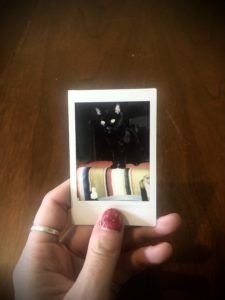
The cat drags herself into the room where my husband and I are talking about what’s to be done. When she drags herself away, my husband hangs his head and weeps. I hear his tears smacking the hardwood floor.
“Oh, baby,” I say. He apologizes and I say he has nothing to apologize for which is not true.
He asks me why I’m not crying and I say, “I am crying,” but, touching my face, I find I’m not.
Years later, while describing this day to my sister, I will discover my husband’s cruelty.
“Oh,” I’ll say, and my sister will assume a ready stance, as if to catch my body with her own.
But here, I see only my husband’s streaming eyes, his wet cheeks, his toothy grimace, which seem for all the world like goodness.
“If you’ll excuse me,” I say, and I drag myself after the cat, who I find has hidden herself under an upstairs sideboard.
“Poor thing,” I say, taking her up and draping her over my shoulder, where I can feel the points of her little ribs.
This cat, once a portly creature, is now as empty as a peel. She grooms me while I waltz her around the upper rooms. I feel her tongue on my neck, dry and warm. Though I don’t think in words like these, I think something like, “Does your kindness know no bounds?”
Soon the time comes for us to do the right thing by the cat and I pack her in her carrier. My husband, stricken, looks at me as if I am a person from his past.
“How can you,” he says.
I ask him if he thinks we’re doing the wrong thing and he says, “We?”
On the ride to the place where it will happen the cat is oddly calm and watchful. She even shows a little life, stretching a back leg and mewing dryly, and a part of me, the part that loves my husband when he makes the morning coffee, says, “Maybe . . . ”
Then the nice lady at the animal hospital takes the cat from her carrier and asks me her name and I say her name and the lady asks me if I would like to come with and I say yes though I most certainly would not and we go back through corridors that are not like the corridors of a hospital but like the corridors of an office and each room might be the room where it will happen. Slung over the nice lady’s shoulder lies my cat, as threadbare as a rag.
“When the time comes,” says another part of me, “who will do this for you?” This part is as merciless as a good friend, and though I will never love her, I will not always hate her as I hate her now.
The lady puts the cat on a steel table.
“It’s okay,” I say to the cat though she is not in any distress. The cat extends her paw, but not to me. She is stretching, or reaching out for something only she can see.
Recommended reading: Elric of Melniboné by Michael Moorcock, The Making of the Atomic Bomb by Richard Rhodes, Desperate Characters by Paula Fox.
